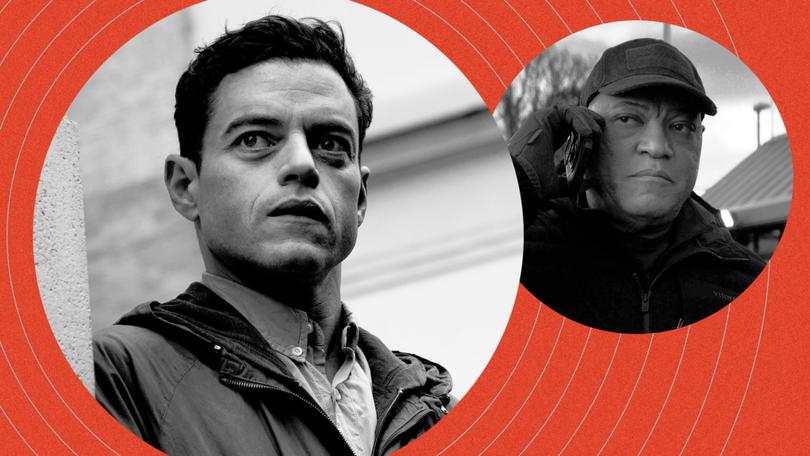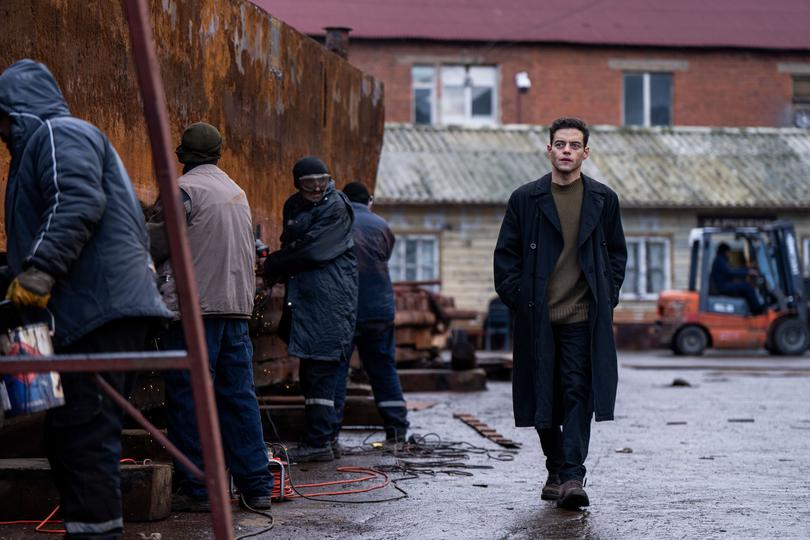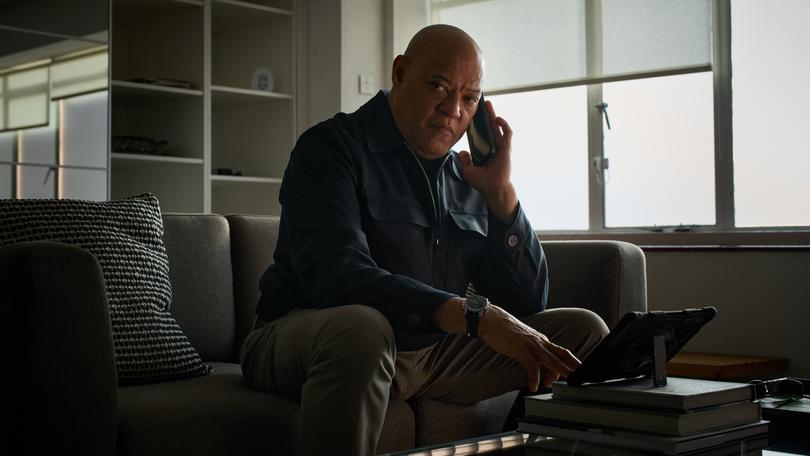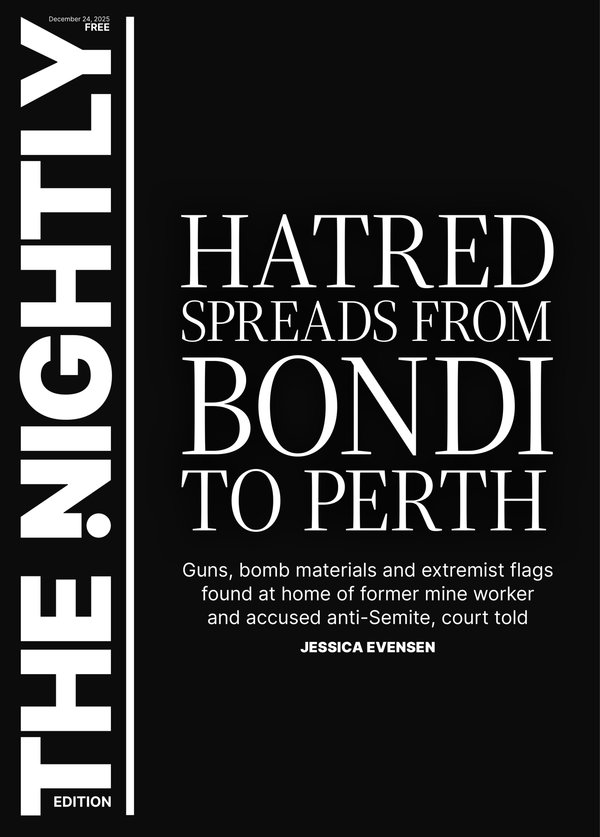The Amateur’s Laurence Fishburne and director James Hawes: A different kind of spy hero

Laurence Fishburne knows the espionage genre well.
Having been involved with Mission: Impossible III and the John Wick movies, he has a pretty good idea of what an audience expects from a trained spy.
The hero in The Amateur, a brainy CIA analyst with zero physical game, is very different, and it’s partly why Fishburne was so keen to sign up.
Sign up to The Nightly's newsletters.
Get the first look at the digital newspaper, curated daily stories and breaking headlines delivered to your inbox.
By continuing you agree to our Terms and Privacy Policy.“We don’t generally follow somebody who, for all intents and purposes, has no idea what they’re doing when it comes to spycraft and, particularly, being a field operative. He’s an analyst, he’s a brain, he’s an intellect, and he’s got super sharp instincts with that,” Laurence told The Nightly.
“But he is not somebody that you send to go assassinate anyone.”
No, Charlie Heller (Rami Malek) is not who you send on a globe-trotting mission to take out a cabal of formidable bad guys.

Charlie’s stature is small compared to Alan Ritchson’s Reacher, he’s less willing to jump out of a plane, train or automobile like Tom Cruise’s Ethan Hunt or just Tom Cruise, he can’t punch out several bad guys like Charlize Theron’s Lorraine Broughton and he’s more emotionally aware than Matt Damon’s Jason Bourne.
But he is the hero for our times.
The Amateur draws on the traditions of the espionage genre but its protagonist is more relatable, not just because he’s driven by grief over lost love.
At the start of the film, Charlie’s wife, Sarah (Rachel Brosnahan), is killed during a terror attack. He uncovers the identities of those responsible only to discover his bosses at the agency already know and have no plans to seek immediate justice.
It’s Charlie’s disbelief and initial impotence that pushes him into the field after a handful of spycraft lessons from Fishburne’s Henderson, an experienced agent and reluctant mentor.
“You put yourself in Charlie’s shoes, you feel the hurt, you feel the anger, and you feel what I think a lot of us do in many aspects of our life at the moment, (which is) we feel disempowered,” director James Hawes said.
“We feel we’re up against forces beyond our influence, opponents we can’t even shout at, let alone take on and challenge properly.
“What we enjoy in this and the genre is the idea that here is a little guy taking on not one but several big bullies and the institutions that go with them, and challenging them and defeating them.”
Most of us don’t have Charlie’s IQ of 170 but in the same way that Charlie looked up to another star operative played by Jon Bernthal, and finds his power is not emulating that but finding his own, Hawes added, “Charlie’s story tells you and the film tells you, there is a best version of yourself that might surprise you”.

Before The Amateur Hawes had helmed six episodes of the superb Gary Oldman spy thriller Slow Horses, but perhaps more importantly, he’s an avid fan of the genre. He grew up with the political thrillers of the 1970s and 1980s and even turned to the likes All the President’s Men and The Insider as stories of a hero up against massive institutions.
Obviously, there was also Bond and Bourne, which were jumping off points from which he wanted to establish The Amateur’s own tone. But they certainly served as inspiration and the choice to shoot on location in London, Paris, Marseille and Istanbul.
It tapped into the globetrotting tropes of the genre, but done a little differently.
“I wanted us to put ourselves in location wherever we could put Heller on the streets,” Hawes said. “But then not to shoot it like a tourist video. It’s very much determined that you don’t see the Eiffel Tower, you don’t see the Blue Mosque.
“We chose the back streets and the small cafes, the places that a spy might go, or someone might go to hide and hang out.” So, there was no HALO jumping onto the roof of the Grand Palais or a wild chase scene around the Arc de Triomphe.
As a student of the genre, Hawes has certainly noticed a resurgence in paranoid spy thrillers, reflecting the heightened social and political tensions of the past few years as division and toxicity rupture our sense of safety and stability.
“Espionage thrillers are a good way of looking at the world turned upside down,” Hawes explained. “That is almost the definition of what happens to (Charlie). The hero goes out the front door and it is a neighbourhood they know but suddenly the world is inverted and things that used to be familiar and safe are suddenly a threat.
“That seems to be, whatever your politics, what’s happening in the world right now. It’s a really useful time to use these kind of stories to look at where we are, look at what we want, look at the threats differently.”
Does it work as a kind of catharsis, a release valve for all that anxiety?
“I’m not sure yet. Arguably, it could be unsettling, it might actually add to some of that nervousness,” Hawes answered. “But it scratches an itch. We may as well have it in a version that’s entertainment.”
How much audiences are entertained and embrace Malek’s unconventional hero could trigger that magic word in Hollywood: franchise.
Hawes said The Amateur could be an origin story, and it also established the relationship between Malek’s Charlie and Fishburne’s Henderson that could carry into future instalments.
“There are additional story beats in there that were not in the first script but we so enjoyed the way Laurence and Rami were playing together,” the director said. “We added in more facets to their story and another scene.”
The possibility is certainly there – and Fishburne would be happy to return.
The actor added, “It does feel like there’s the potential for a follow-up to this movie. If that were to happen, and all of the same players were involved, you can count me in.”
The Amateur is in cinemas on April 10

